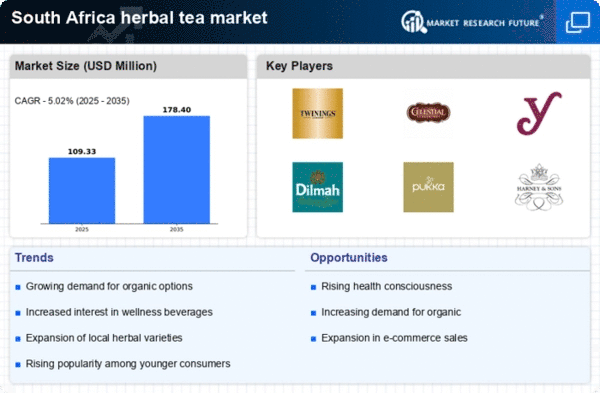The South Africa Herbal Tea Market is characterized by a dynamic landscape featuring various players committed to tapping into the growing demand for natural and health-focused products. As consumer awareness around wellness and the benefits associated with herbal blends increases, competition is expected to intensify. Many companies are strategically positioning themselves by offering a diverse range of flavors and blends that cater to local tastes while also promoting the health benefits of their products. This market remains influenced by changing consumer preferences, economic factors, and the expansion of retail distribution channels.
Local and international brands are continuously innovating to enhance their product offerings, resulting in a vibrant and competitive atmosphere.Pukka Herbs has established a noticeable presence in the South African Herbal Tea Market, focusing on delivering organic and ethically sourced herbal blends that appeal to health-conscious consumers. The brand's strengths lie in its commitment to sustainability and quality, which are significant factors attracting customers who value natural ingredients. Pukka Herbs emphasizes awareness of environmental impacts and sustainability, which resonates with the growing consumer interest in eco-friendly practices and healthy lifestyles.
Its unique blends, featuring exotic herb combinations, also cater to a variety of health needs and preferences. Furthermore, Pukka Herbs effectively utilizes marketing campaigns that highlight the health benefits of its products, building a loyal customer base within the South African market.Knorr, while traditionally known for its seasonings and convenience foods, has made significant strides in the South African Herbal Tea Market by diversifying its product offerings to include herbal tea varieties that complement its existing portfolio.
The brand leverages its extensive distribution network to reach a broad audience, ensuring that its herbal teas are available in various retail outlets across the country. Knorr's key strengths in this market include established brand recognition and customer trust built over years of providing quality food products. The company focuses on creating herbal tea blends that align with South Africa’s cultural preferences and health trends, offering flavors that resonate with local consumers.
Through strategic partnerships and potential mergers, Knorr is poised to expand its reach and enhance its market presence, continuing to innovate in both the herbal and functional beverage segments within South Africa.






















Leave a Comment